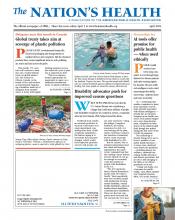
Community health worker students at the University of California-San Diego pinpoint health care deserts on a map.
Courtesy of the University of California-San Diego
A diverse group of San Diego-area residents are learning how to help meet the health needs of immigrant communities and beyond, thanks to a local training program.
Led by the University of California-San Diego’s Herbert Wertheim School of Public Health and Human Longevity Science, the program is recruiting and training hundreds of residents to become community health workers. The goal is to support and improve health within the region’s immigrant, refugee and American Indian communities by working from within.
“These are the communities that are falling through the cracks,” Wael Al-Delaimy, MD, PhD, an epidemiologist, public health professor and director of the program, told The Nation’s Health. “What we offer is a comprehensive training package that makes them valuable to health care facilities or the community they work in.”
Immigrants, including refugees, are estimated to account for about 22% of San Diego County’s 3.2 million population. San Diego has the nation’s second-largest U.S. population of immigrants from Somalia, and in recent years has welcomed refugees from Afghanistan, Haiti, Syria, Iraq, the Democratic Republic of Congo and beyond. Nearly 70 languages are spoken in the county.
Immigrants often arrive with little money, prospect for employment and understanding of American health care and may look to others in their community for guidance. While community health worker training has long been in place to serve the needs of the more than 1 million Hispanics who live in San Diego County, a similar program to aid other groups was missing.
Community health worker training was also needed for the county’s American Indian population, which comprises four tribal groups and about 24,300 residents, many of whom live in poverty and have poor access to care.
The University of California-San Diego-led training initiative — known as the San Diego Community Health Workers for Advancing Public Health within Immigrant-Refugee and Native American Communities Program — is working to meet those needs with partners that include the California Consortium for Urban Indian Health, the Hospital Association of San Diego and Imperial Counties, and Family Health Centers of San Diego.
The program is funded through a $3 million grant from the U.S. Health Resources and Services Administration. The grant is part of $225 million being allocated to more than 80 community health worker training and service organizations. San Diego’s program helps participants work toward community health worker training certification and provides transportation, child care, mentorship and job placement.
The program welcomed its first trainees in July. Most participants are women from underrepresented communities that they will likely serve upon graduation. Schedules are flexible, balancing classroom and remote learning. Training involves developing skills in etiquette, communication, organization and basic health care. Recruiters focus on people who are highly motivated, bilingual, driven to serve communities and are career-minded.
Some trainees have advanced health degrees from other countries, Al-Delaimy said, but typically the U.S. requires further education and exams before immigrants can obtain a U.S. medical license or health care certification. The demands can be overwhelming for people arriving in a new country and who may have not practiced in their field of training recently.
Joselyn Betancourt, who lives in Otay Mesa, California, is set to graduate the San Diego program in summer. She travels to the University of California-San Diego twice a week for coursework.
Betancourt, who holds an undergraduate degree in biology, hopes to work for a local family outreach center that aids parents in family health, child care and nutrition. As a single mother of two, she received similar aid for her daughters from service providers, she said. Now she wants to give back.
The goal is to help “parents get the resources they need for better health for their children,” Betancourt told The Nation’s Health.
For more on the San Diego program, visit bit.ly/sandiegochw.
- Copyright The Nation’s Health, American Public Health Association









